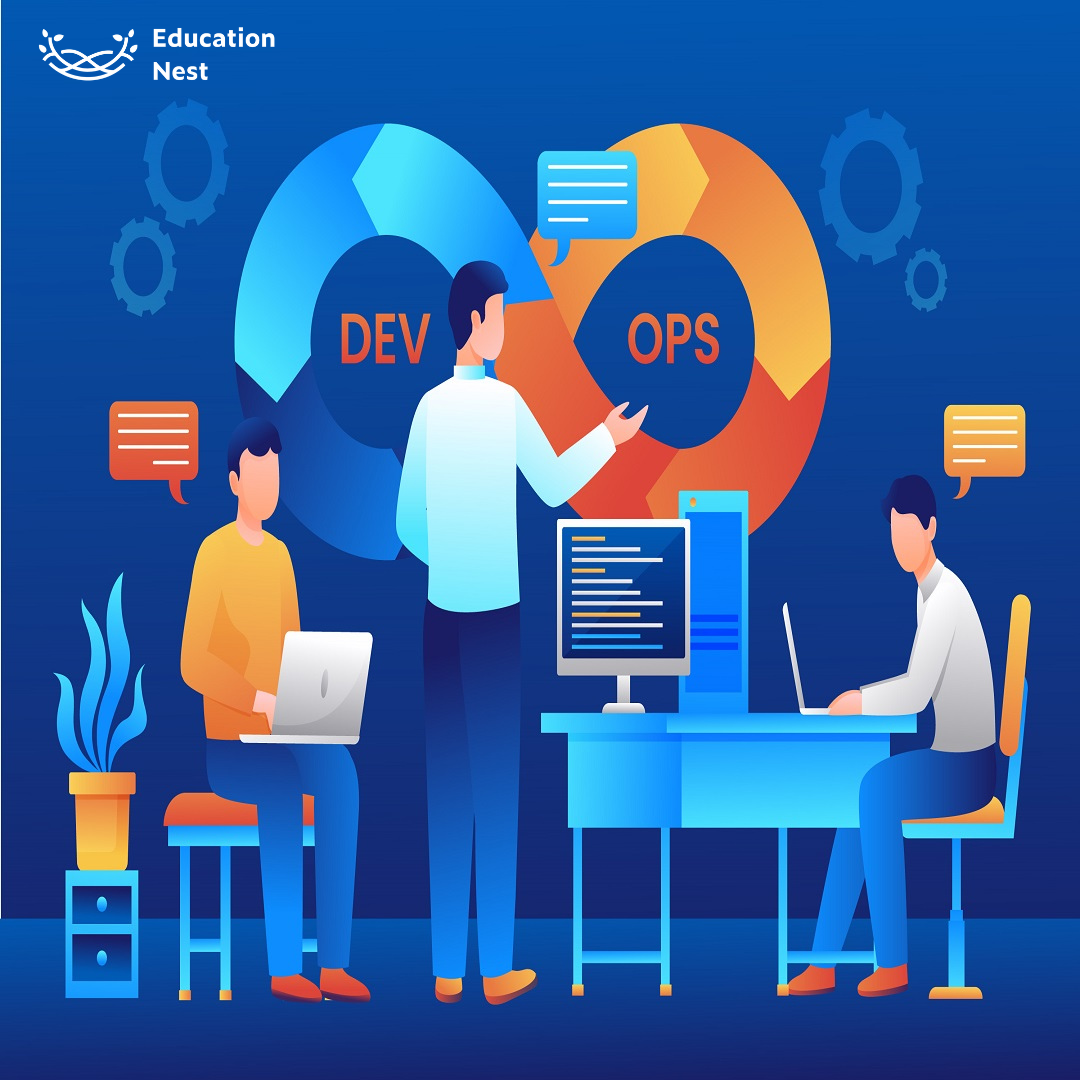
There is a lot of doubt regarding a DevOps Engineer’s salary, roles, responsibilities, and skills. In this blog post, we will discuss the DevOps engineer’s salary, DevOps engineers skills, tools, and responsibilities. The opportunities in the field of DevOps engineering is rapidly growing, and there are a lot of opportunities for DevOps engineer in India.
What do you understand by DevOps?
DevOps is a strategy to develop software that fills the space between the IT staff and developers. It is a tool that makes it easier for the company to get services and apps to customers faster.
There are some benefits of DevOps:
- Fast delivery: Increase the number of releases and how fast they come out so you can develop new ideas and improve your product more quickly. The quicker you can add new features and fix bugs, the faster you can meet customer needs and get ahead of the competition.
- Reliability: Make sure that application updates and infrastructure changes are of good quality to reliably deliver faster while still giving end users a good experience. Use continuous integration and delivery methods to ensure that each change works and is safe.
- Helps in scaling: Run and manage your infrastructure and development processes at scale. Automation and consistency help you manage complicated or change systems quickly and safely.
- Increase collaboration: A DevOps cultural model, which emphasizes ownership and responsibility, can help you build more effective teams. Developers and operations teams work together closely, share many responsibilities, and combine their workflows. This cuts down on waste and saves time.
- Higher security: Move quickly while staying in control and following the rules. You can use a DevOps model without propitiatory security by using automatic compliance policies, fine-grained controls, and configuration management techniques.
Who is a DevOps engineer?
The DevOps engineers take care of the operations of software development, using engineering tools and knowing how the software development process works to make updates and new software easier to make and use. Most of the time, they are senior technology professionals who lead and coordinate the teams that make or use software for the company. They keep an eye on code updates and may take on different roles as they help their coworkers design, build, test, and release software to customers. DevOps engineers know a lot about the agile method, industry standards, and the networks and processes in their own companies.
DevOps engineer salary:

DevOps has a lot of demand, but companies need people with the right skill sets. Also, the salary goes up the more experience a person has. PayScale says that the average DevOps engineer’s salary in India is Rs 674,202 per year. This number includes bonuses and profit-sharing.
The total pay for a DevOps Engineer salary in the United States is estimated to be $133,874 per year, with an average salary of $104,596 annually. These numbers are the median, which is the middle point of the ranges from our Total Pay Estimate model and is based on the salaries that our users gave us. The extra pay is expected to be $29,278 per year. Additional money could come as a cash bonus, a commission, tips, or a share of the profits.
What are the DevOps engineer’s skills?
The DevOps engineer’s skills are essential for them are:
- Good problem-solving skills: They must be able to solve complex problems quickly and efficiently. Prior experience is needed in finding and solving a software development problem.
- Understanding of Relevant Tools: The tools used at each step of implementing DevOps affect how well it works. Because of DevOps, there are just too many new tools to keep track of. Still, it’s essential to talk in-depth about how important it is to make DevOps work.
- Automation Skills: To be a DevOps engineer, you need to know a lot about automation, which is the core of DevOps processes. This set of skills goes hand in hand with learning how to use DevOps tools, code, and script.
- Cloud Skills: Cloud and DevOps are a great match for each other. To function optimally, one needs the other. They realized they needed to take continuous monitoring to the cloud to improve performance. The cloud enables the three pillars of the DevOps technique that propel a process: testing, deployment, and Release.
- Soft Skills: When developers and operations staff talk to each other clearly, they can build and release software on time and with good quality and help market the app with lower costs and better quality.
A DevOps professional may also help businesses and customers get along better with each other. Those who wish to work in the field must be able to listen carefully, negotiate, solve problems, and put together teams.
Some examples of DevOps Engineer Tools:
- Site24x7: Site24x7 is a SaaS-based, all-encompassing monitoring tool for DevOps and IT. Site24x7 AppLogs is a log executive solution that gathers data from various places, including servers, apps, network devices, log frameworks, and the cloud, then processes and analyses it.
- JIRA: Hundreds of developers use JIRA as their issue-tracking system because it is so easy to use. JIRA is a commercial product that helps teams keep track of problems, decide which ones are most important, and talk about them. It is a valuable tool for writing and development because it works well in both environments.
- ManageEngine Applications Manager: DevOps administrators in various fields have found ManageEngine Applications Manager to be an invaluable resource for keeping tabs on infrastructure and application health.
- Query Surge: Query Surge is a pioneering service since it provides a comprehensive DevOps solution for continuous data testing. It’s the first of its type and a smart data testing solution.
- Desktop Central: Administrators can use Desktop Central’s settings to manage
Applications, system settings, desktop settings, and security ethics. With the collection feature, it can be used to deploy a group of configurations at the same time.
DesktopCentral is a UEM solution that lets you manage traditional and modern IT from a single console.
- Firewall Analyzer: Firewall Analyzer is log management software that may be used to examine logs from firewalls and other security devices.
- Jenkins: Jenkins is a tool used in the DevOps process to monitor functions’ regularity. One of the most valuable instruments for releasing programs to the public.
You Must Know: How to Master Pattern Program in Python: The Ultimate Guide
DevOps engineer roles and responsibilities:
- Testing and developing the software: The person or people in this role make the software’s basic structure. This group is made up of ordinary programmers and coders. Professionals are in charge of both writing the code and testing it. Even though the title hasn’t changed, a software developer/tester now has much more to do. Not only do they have to turn new requirements into code, but they also have to do unit testing, deploy the code, and keep an eye on how it works in production.
- Security Engineer: Security engineers are just as crucial as other roles because they ensure the product is delivered on time. They work with the programmers to ensure their ideas (security patches) are added immediately.
In addition to keeping an eye out for possible threats from the outside, they also keep an eye on internal metrics like uptime and performance. Security Engineers’ main job is to make sure that incidents of downtime or security threats don’t happen again.
- Expert in Automation: The importance of this role doesn’t need to be stressed again because DevOps is all about automation. As an automation expert, this role should also know what can be automated and how a product stack can be connected to another product stack. This role, which is also called “Integration Specialist,” analyses, designs, and implements strategies for continuous deployments while providing high availability on production and pre-production systems.
- Release Manager: This role is a vital part of the product deliverables because the person in this role has connected the new or updated features to the already existing framework. This role can be filled by the same person who is also the Release Engineer, or it can be filled by a Release Manager who is the head of a team of Release Engineers. The main focus of this role is to coordinate and manage the product from the time it is created until it is put into use. Since this role is essential, it should be filled by a technical person who knows how technology works and how different parts fit together. Depending on the need, there will be more than one Manager in charge of their teams working on more than one feature.
- DevOps Innovator: As I said before, this is an essential part of DevOps. This is the job of a leader or the person in charge of making sure that the DevOps strategy is used in the development of the product from start to finish while creating an better environment.
Conclusion:
I hope you liked my blog on DevOps Engineers. As today DevOps Engineers play an essential role in software development. High demand for fast and stable delivery of software.
Overall, DevOps engineers are important in a rapidly growing world and increasing competition in the development of software and their expertise is essential for companies who want to stay ahead of the competition.

